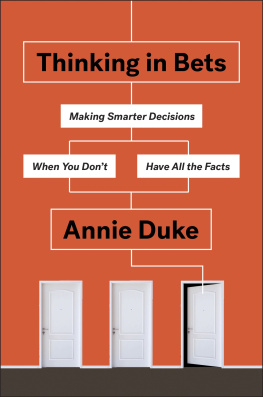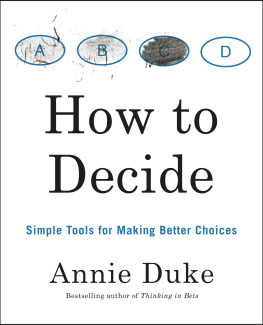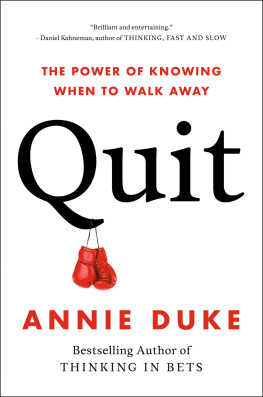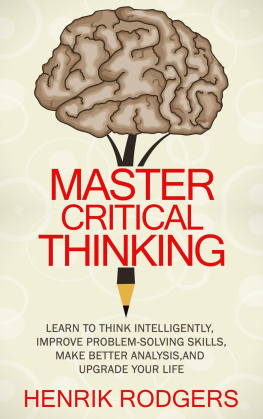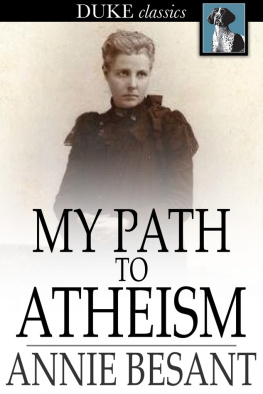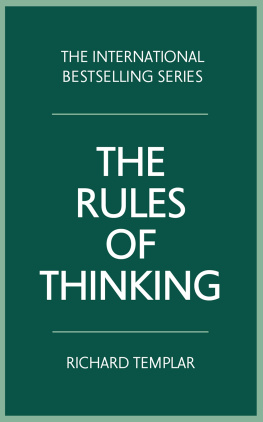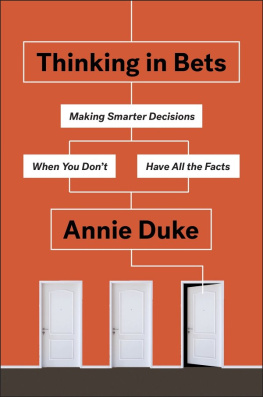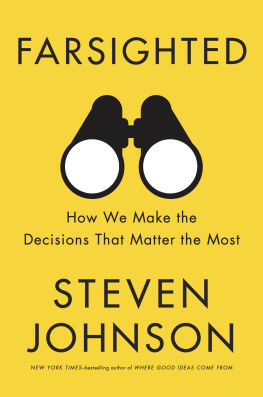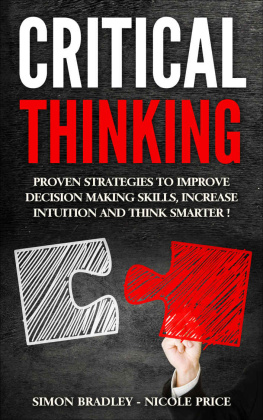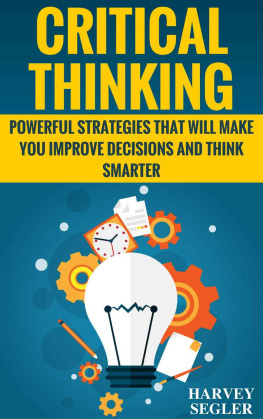Annie Duke - Thinking in bets : making smarter decisions when you don’t have all the facts
Here you can read online Annie Duke - Thinking in bets : making smarter decisions when you don’t have all the facts full text of the book (entire story) in english for free. Download pdf and epub, get meaning, cover and reviews about this ebook. year: 0, genre: Romance novel. Description of the work, (preface) as well as reviews are available. Best literature library LitArk.com created for fans of good reading and offers a wide selection of genres:
Romance novel
Science fiction
Adventure
Detective
Science
History
Home and family
Prose
Art
Politics
Computer
Non-fiction
Religion
Business
Children
Humor
Choose a favorite category and find really read worthwhile books. Enjoy immersion in the world of imagination, feel the emotions of the characters or learn something new for yourself, make an fascinating discovery.
- Book:Thinking in bets : making smarter decisions when you don’t have all the facts
- Author:
- Genre:
- Year:0
- Rating:3 / 5
- Favourites:Add to favourites
- Your mark:
- 60
- 1
- 2
- 3
- 4
- 5
Thinking in bets : making smarter decisions when you don’t have all the facts: summary, description and annotation
We offer to read an annotation, description, summary or preface (depends on what the author of the book "Thinking in bets : making smarter decisions when you don’t have all the facts" wrote himself). If you haven't found the necessary information about the book — write in the comments, we will try to find it.
Annie Duke: author's other books
Who wrote Thinking in bets : making smarter decisions when you don’t have all the facts? Find out the surname, the name of the author of the book and a list of all author's works by series.
Thinking in bets : making smarter decisions when you don’t have all the facts — read online for free the complete book (whole text) full work
Below is the text of the book, divided by pages. System saving the place of the last page read, allows you to conveniently read the book "Thinking in bets : making smarter decisions when you don’t have all the facts" online for free, without having to search again every time where you left off. Put a bookmark, and you can go to the page where you finished reading at any time.
Font size:
Interval:
Bookmark:



Portfolio/Penguin
An imprint of Penguin Random House LLC
375 Hudson Street
New York, New York 10014

Copyright 2018 by Annie Duke
Penguin supports copyright. Copyright fuels creativity, encourages diverse voices, promotes free speech, and creates a vibrant culture. Thank you for buying an authorized edition of this book and for complying with copyright laws by not reproducing, scanning, or distributing any part of it in any form without permission. You are supporting writers and allowing Penguin to continue to publish books for every reader.
Library of Congress Cataloging-in-Publication Data
Names: Duke, Annie, 1965- author.
Title: Thinking in bets : making smarter decisions when you dont have all the facts / Annie Duke.
Description: New York : Portfolio, 2018. | Includes bibliographical references and index.
Identifiers: LCCN 2017042666 | ISBN 9780735216358 (hardback) | ISBN 9780735216365 (epub)
Subjects: LCSH: Management games. | Decision making. | BISAC: BUSINESS & ECONOMICS / Decision-Making & Problem Solving. | PSYCHOLOGY / Cognitive Psychology. | BUSINESS & ECONOMICS / Strategic Planning.
Classification: LCC HD30.6 .D85 2018 | DDC 658.4/0353dc23 LC record available at https://lccn.loc.gov/2017042666
Version_1
To Lila and Henry Gleitman, generous of heart and intellect
When I was twenty-six, I thought I had my future mapped out. I had grown up on the grounds of a famous New Hampshire prep school, where my father chaired the English department. I had graduated from Columbia University with degrees in English and psychology. I had attended graduate school at the University of Pennsylvania, where I won a fellowship from the National Science Foundation, earning a masters and completing my doctoral course work in cognitive psychology.
But I got sick right before finishing my dissertation. I took a leave of absence, left Penn, got married, and moved to a small town in Montana. Not surprisingly, my NSF fellowship didnt cover my cross-country experiment in adulting, so I needed money. My brother Howard, a professional poker player who had already made the final table of the World Series of Poker by this time, suggested I check out the legal poker games in Billings. This suggestion wasnt as random as it might sound. I grew up in a competitive, games-playing family, and Howard had brought me out to Las Vegas a few times for vacations I couldnt otherwise afford on my stipend. I had watched him play, and played in a few low-stakes games myself.
I fell in love with poker right away. It wasnt the bright lights of Vegas that lured me in, but the thrill of playing and testing my skills in the basement of a Billings bar named the Crystal Lounge. I had a lot to learn, but I was excited to learn it. My plan was to earn some money during this break from school, stay on the academic path, and continue playing poker as a hobby.
My temporary break turned into a twenty-year career as a professional poker player. When I retired from playing in 2012, I had won a World Series of Poker gold bracelet, the WSOP Tournament of Champions, and the NBC National Heads-Up Championship, and earned more than $4 million in poker tournaments. Howard, meanwhile, went on to win two World Series bracelets, a pair of titles at the Hall of Fame Poker Classic, two World Poker Tour championships, and over $6.4 million in tournament prize money.
To say that I had strayed from the academic path might seem like an understatement. But I realized pretty quickly that I hadnt really left academics so much as moved to a new kind of lab for studying how people learn and make decisions. A hand of poker takes about two minutes. Over the course of that hand, I could be involved in up to twenty decisions. And each hand ends with a concrete result: I win money or I lose money. The result of each hand provides immediate feedback on how your decisions are faring. But its a tricky kind of feedback because winning and losing are only loose signals of decision quality. You can win lucky hands and lose unlucky ones. Consequently, its hard to leverage all that feedback for learning.
The prospect of some grizzled ranchers in Montana systematically taking my money at a poker table forced me to find practical ways to either solve this learning puzzle or go broke. I was lucky, early in my career, to meet some exceptional poker players and learn from them how they handled not only luck and uncertainty but also the relationship between learning and decision-making.
Over time, those world-class poker players taught me to understand what a bet really is: a decision about an uncertain future. The implications of treating decisions as bets made it possible for me to find learning opportunities in uncertain environments. Treating decisions as bets, I discovered, helped me avoid common decision traps, learn from results in a more rational way, and keep emotions out of the process as much as possible.
In 2002, thanks to my friend and super-successful poker player Erik Seidel turning down a speaking engagement, a hedge-fund manager asked me to speak to a group of traders and share some poker tips that might apply to securities trading. Since then, I have spoken to professional groups across many industries, looking inward at the approach I learned in poker, continually refining it, and helping others apply it to decisions in financial markets, strategic planning, human resources, law, and entrepreneurship.
The good news is that we can find practical work-arounds and strategies to keep us out of the traps that lie between the decisions wed like to be making and the execution of those decisions. The promise of this book is that thinking in bets will improve decision-making throughout our lives. We can get better at separating outcome quality from decision quality, discover the power of saying, Im not sure, learn strategies to map out the future, become less reactive decision-makers, build and sustain pods of fellow truthseekers to improve our decision process, and recruit our past and future selves to make fewer emotional decisions.
I didnt become an always-rational, emotion-free decision-maker from thinking in bets. I still made (and make) plenty of mistakes. Mistakes, emotions, losingthose things are all inevitable because we are human. The approach of thinking in bets moved me toward objectivity, accuracy, and open-mindedness. That movement compounds over time to create significant changes in our lives.
So this is not a book about poker strategy or gambling. It is, however, about things poker taught me about learning and decision-making. The practical solutions I learned in those smoky poker rooms turned out to be pretty good strategies for anyone trying to be a better decision-maker.
Thinking in bets starts with recognizing that there are exactly two things that determine how our lives turn out: the quality of our decisions and luck. Learning to recognize the difference between the two is what thinking in bets is all about.
Font size:
Interval:
Bookmark:
Similar books «Thinking in bets : making smarter decisions when you don’t have all the facts»
Look at similar books to Thinking in bets : making smarter decisions when you don’t have all the facts. We have selected literature similar in name and meaning in the hope of providing readers with more options to find new, interesting, not yet read works.
Discussion, reviews of the book Thinking in bets : making smarter decisions when you don’t have all the facts and just readers' own opinions. Leave your comments, write what you think about the work, its meaning or the main characters. Specify what exactly you liked and what you didn't like, and why you think so.

